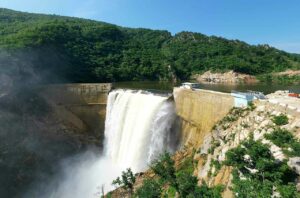Sierra Leone Closes Waters to Industrial Fishers this Month
The government of Sierra Leone has closed its national waters to industrial fishing for the month of April in an attempt to assess what actions need to be taken to ease pressure on the West African country’s fish stocks. While the moratorium is in place, Sierra Leone’s fisheries authorities plan to carry out a thorough assessment of the state of its fish populations, as well as enact new monitoring, control, and surveillance measures to deter future fishing violations from taking place. The majority of the country’s industrial fishing sector is made up of foreign distant water fishing vessels that the country has opened its waters to through access agreements. However, national officials have blamed diminishing fish populations on the bad behavior of the industrial sector, including foreign vessels, who they accuse of overfishing and taking part in IUU fishing practices. A recent BBC documentary highlighted the increase of Chinese industrial fishing in West Africa, particularly off Sierra Leone. West Africa as a whole has become a major destination for foreign industrial fleets who take advantage of weak fisheries management and enforcement to flout fishing laws and overexploit available resources. As a result, local fishing communities have suffered economic losses due to shrinking catches. This has threatened the livelihood of Sierra Leone’s fishing communities, as well as undermined the food security of communities that rely on seafood as a primary source of protein. Although one month will not be enough time for fish stocks to recover, the ban sends a strong message to foreign industrial fleets operating in its waters that Sierra Leone is taking steps to improve the sustainable management of its resources.
Iran Experiences Widespread Flooding On Top of Drought
Iran has experienced record rainfall this year which has caused near nationwide flooding since mid-March, with 24 of its 31 provinces affected. Described by officials as the worst flooding seen in 70 years, the flood has impacted nearly 1,900 cities and settlements, and upwards of 86,000 people have been forced to evacuate. Early assessments have estimated costs as high as $350 million USD to the country’s agricultural sector alone. The floods have come as another blow to Iran which has already seen other shifting weather patterns strain its communities and state capacity. In recent years, its southern Sistan and Baluchistan provinces have suffered prolonged droughts that have been exacerbated by poor water management infrastructure, leading to agricultural losses, desertification, and mass migration out of the region. Both the heavy rain and the droughts in Iran are two sides of the same coin – unpredictable and uneven changes in local weather and climate norms due to global climate change. The twin environmental disasters illustrate the varying difficulties climate change will present to national securities and economic sectors.
Sri Lanka Receives World Bank Support in Climate Resilience
This month Sri Lanka and the World Bank signed two agreements worth $150 million USD to fund multiple projects improving infrastructure resilience to climate change with an emphasis on improving agriculture productivity for small-scale farmers. More than 470,000 farmers located in the dry zone of the island nation will benefit from irrigation infrastructure funds totaling $125 million USD, while also receiving training in water management and cropping patterns to better withstand drought. The remaining funds will go towards the establishment of an investment platform that Sri Lanka will use to fulfill future development projects. Global agriculture is expected to face a variety of challenges from climate change, including altered rainfall patterns, disruption of growing cycles, and rises in pests and disease. Steps taken now to adapt the sector to changes and mitigate negative effects are crucial to avoiding the worst of the social and economic consequences climate change may hold.



